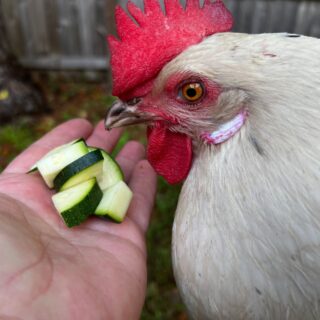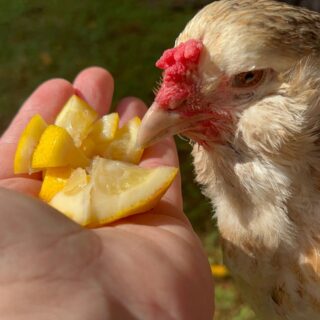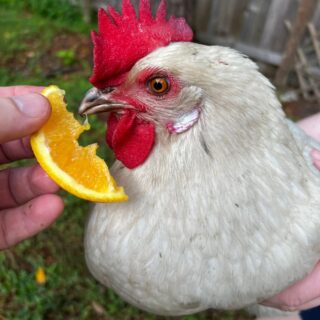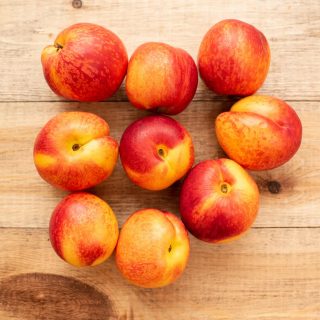Rhubarb pie is an American staple. It is super tasty and that is in large part because rhubarb on it’s own is very good. Unfortunately, rhubarb gets a bad rap sometimes because people believe it to be toxic for them AND their animals. So, can chickens eat rhubarb or will they eat it and end up plant food themselves?
Still along to find out just what happens when chickens eat rhubarb!
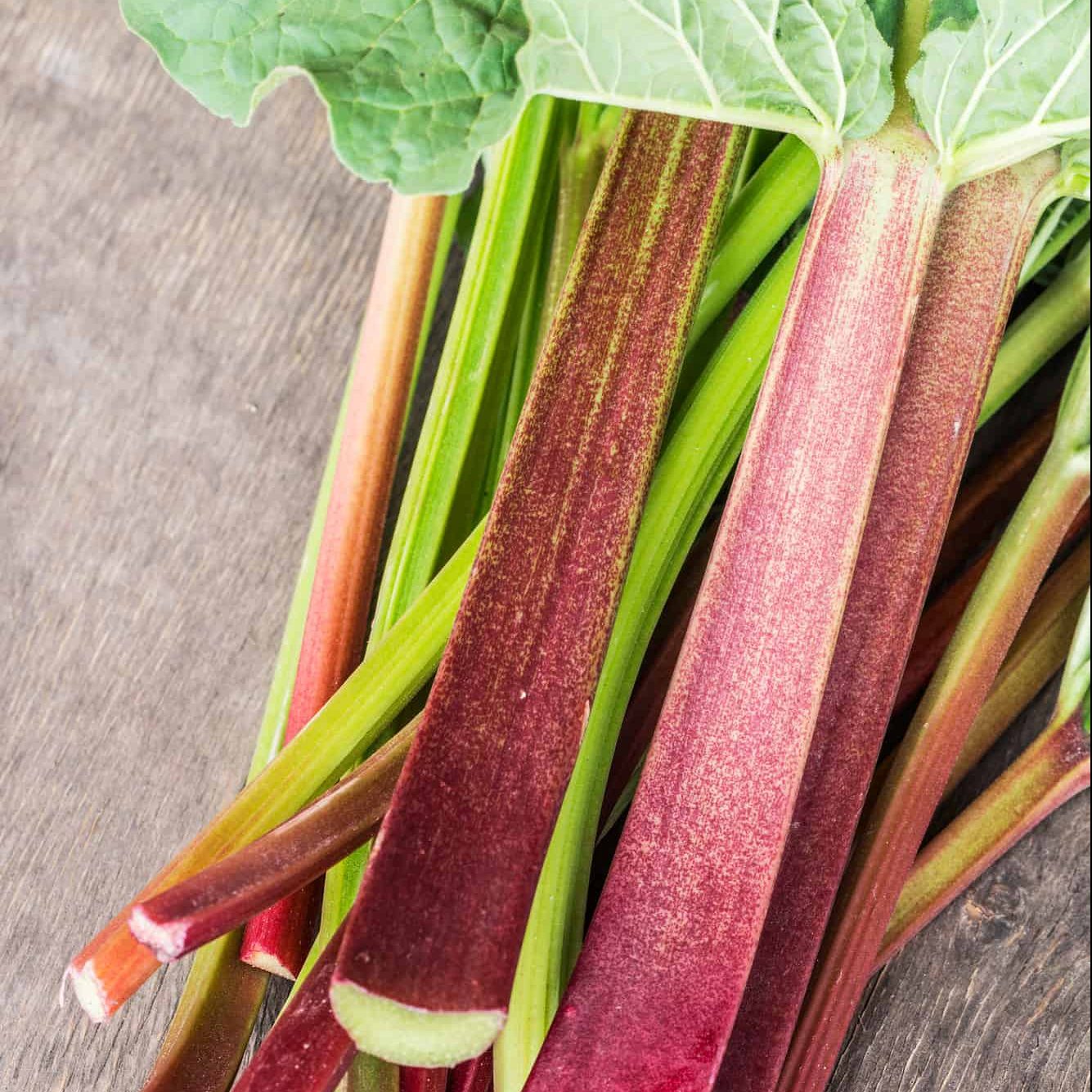
[ez-toc]
Can Chickens Eat Rhubarb?
Yes, chickens can eat rhubarb stalks in very small amounts. However, they cannot eat rhubarb leaves due to oxalis acid contained in them. Oxalis acid can possibly lead to kidney failure and, in some cases, death.
When feeding the stalks, it’s best to cut them into smaller, bite-size pieces and scatter them for your chickens. Rhubarb can be a good supplemental snack but only in tiny amounts fed only occasionally.
Can Chickens eat rhubarb stalks?
Yes, chickens can eat rhubarb stalks if fed in significant moderation. They contain many healthy vitamins and minerals such as Vitamin A and Vitamin C.
Can chickens eat rhubarb pie or crumble?
They can eat rhubarb pie and rhubarb crumble but they really shouldn’t. The amount of sugar is much to high for your chickens and can be a potential health risk.
Can chickens eat rhubarb flowers?
No, chickens cannot eat rhubarb flowers due to the oxalic acid content. More information on that below.
Can Chickens eat rhubarb seeds?
Again, chickens cannot eat rhubarb seeds, due to the oxalic content.
Can Chickens eat rhubarb leaves?
Nope, chickens cannot eat rhubarb leaves. Unlike when chickens eat zucchini which the whole plant is safe, only part of rhubarb is considered somewhat safe. The rest of the rhubarb plant all fall into the potentially dangerous category.
Oxalate poisoning, or rhubarb leaf poisoning, in humans will present itself initially through symptoms like vomiting, diarrhea, and abdominal pain. Your chickens aren’t going to vomit but they can get diarrhea.
It is also sometimes possible to tell when your chickens are experiencing pain. You may also be able to carefully palpate their abdomen and see if they are tender; but this is difficult to really tell.
Other, more chicken specific, signs you may notice during your routine health checks are lethargy, puffed up feathers, abnormal movement, or just acting differently in general.
Source: https://www.healthline.com/nutrition/rhubarb-leaves
Need some help keeping your chickens health and care taken care of? Check out the Organized Chicken Keeper for an easy to follow system.
Oxalic Acid
Oxalic acid, while also found in rhubarb stalks, is much more prevalent in the leaves which is what makes them so dangerous.
For people, our bodies eliminate about 40 to 50 mg per day and only around 10” of that comes from what we eat. In general, humans take in, through diet or other means, between 200 and 300 mg a day. More than this can cause oxalate to buildup and lead to a variety of health issues. Specifically, buildup of oxalate in the kidneys can cause kidney failure.
Cooking will reduce the amount of oxalate content as will soaking it raw; but soaking will can also reduce other nutrients, as well.
Rhubarb is not the only vegetable that contains Oxalic acid. There are many others, to varying degrees. Typically, you will find it in their leaves and not the vegetable itself, or at least not in very high quantities.
Chickens can eat asparagus and it is also high in oxalic acid. Chickens can eat onions, chickens can eat radishes and chickens can eat sweet potatoes all of which also have oxalic acid.
This chart show some vegetables that contain oxalic acid and what levels.
| Vegetables | Oxalic Acid (g/100g) |
|---|---|
| Asparagus | 0.13 |
| Beans, snap | 0.36 |
| Beet leaves | 0.61 |
| Beetroot | 0.06 |
| Broccoli | 0.19 |
| Brussels sprouts | 0.02 |
| Cabbage | 0.10 |
| Carrot | 0.50 |
| Cassava | 1.26 |
| Cauliflower | 0.15 |
| Celery | 0.19 |
| Chives | 1.48 |
| Collards | 0.45 |
| Corn, sweet | 0.01 |
| Cucumber | 0.02 |
| Eggplant | 0.19 |
| Garlic | 0.36 |
| Kale | 0.02 |
| Lettuce | 0.33 |
| Okra | 0.05 |
| Onion | 0.05 |
| Parsley | 1.70 |
| Parsnip | 0.04 |
| Pea | 0.05 |
| Bell pepper | 0.04 |
| Potato | 0.05 |
| Purslane | 1.31 |
| Radish | 0.48 |
| Rhubarb leaves | 0.52 |
| Spinach | 0.97 |
| Squash | 0.02 |
| Sweet potato | 0.24 |
| Swiss Chard, green | 0.96 |
| Tomato | 0.05 |
| Turnip | 0.21 |
Is rhubarb healthy for chickens?
Rhubarb can be healthy for chickens, assuming they are eating a moderate amount and avoiding the leaves, flowers, and seeds of the plant. This veggie is packed with many vitamins, minerals, and nutrients to keep them running smoothly.
What are the nutritional benefits of rhubarb for chickens?
The table below, courtesy of the USDA FoodData Center, has a breakdown of the nutritional analysis based on a serving size of 1 rhubarb stalk (51g).
| Name | Amount | Measurement |
|---|---|---|
| Water | 47.700 | g |
| Energy | 10.700 | kcal |
| Protein | 0.459 | g |
| Fat | 0.102 | g |
| Carbohydrate, by difference | 2.320 | g |
| Fiber, total dietary | 0.918 | g |
| Sugars, total including NLEA | 0.561 | g |
| Calcium, Ca | 43.900 | mg |
| Iron, Fe | 0.112 | mg |
| Magnesium, Mg | 6.120 | mg |
| Phosphorus, P | 7.140 | mg |
| Potassium, K | 147.000 | mg |
| Sodium, Na | 2.040 | mg |
| Zinc, Zn | 0.051 | mg |
| Copper, Cu | 0.011 | mg |
| Manganese, Mn | 0.100 | mg |
| Selenium, Se | 0.561 | µg |
| Vitamin C, total ascorbic acid | 4.080 | mg |
| Folate, total | 3.570 | µg |
| Vitamin A, RAE | 2.550 | µg |
| Carotene, beta | 31.100 | µg |
| Vitamin A, IU | 52.000 | IU |
What do these nutrients do?
Here is a brief rundown of what some of nutrients on the table above mean for your chickens' health.
- Antioxidants: repair damage from free radicals, fight off/prevent future damage, protect from oxidative damage, anti-inflammatory, lower blood pressure, improve heart health in high enough doses, development and health of tissue, skin, and feathers
- Vitamin A: eye, skin, respiratory, and digestive health
- Carotene, Beta (Beta Carotene): egg, feathers, skin, beak, and comb color; converts to Vitamin A
- Vitamin C: joint, cellular, and immune health; collagen synthesis
- Carbohydrates: give chickens energy
- Vitamin E:
- Fiber: only small amounts or they can become constipated, get a blockage, etc; energy, growth, and digestive health
- Folate (B Vitamin): folate deficiency; helps blood formation; healthy feathers & size
- Iron: prevents anemia; assists in blood circulation
- Vitamin K: blood clotting, bone metabolism
- Manganese: bone development, immune system, breaks down carbs, cholesterol, and amino acids; controls blood sugar
- Protein: muscle growth and development
- Selenium: Boosts their immune system and helps with over nutrient balance in selenium deficient areas (most of the US)
How do you feed rhubarb to chickens?
Remove all of the leaves, strings along the stalk, and the tough ends of the stalks. Cut into small pieces and scatter. You can feed raw or cooked (boiled).
Frequently Asked Questions
Q1. Can I overfeed my chickens rhubarb?
We recommend only feeding nectarines around 1 to 3 times a week. This will give them all of the health benefits while also minimizing the risks that come with too much sugar.
Q2. How much rhubarb can I feed to my chickens?
A single rhubarb stalk, when cut into small cubes, can probably feed around 4 or 5 chickens.
Q3. How often can I feed rhubarb to my chickens?
We recommend no more than 4 times a week; reducing if you start to notice a change or decline in their health and temperament. We like to go by the 90/10 rule which says 90% of their diet should come from free ranging and a chicken feed with only 10% coming from other sources like snacks, treat, and supplements.
Q4. Can chicks eat rhubarb?
We do not recommend feeding rhubarb to your chicks. Until they are old enough to join the rest of the outside flock, it’s best to keep them on a good quality starter/grower feed.
Q6. What other fruits and vegetables are safe for chickens?
Here are some popular foods that your chickens can eat.
Fruits
- Apples (not the seeds)
- Bananas
- Cantaloupe
- Cherries
- Figs
- Kiwi
- Peaches
- Watermelon
Vegetables & Gourdes
- Asparagus
- Pumpkin
- Radish
- Sweet Potato
- Tomatoes
- Yellow Squash
- Zucchini
Berries
- Blackberries
- Blueberries
- Mountain Ash Berries
- Mulberries
- Raspberries
- Rowan Berries
If you need more help with taking care of your chickens, check out The Organized Chicken Keeper for a complete system for managing their health through keeping their supplies stocked and coop clean.

